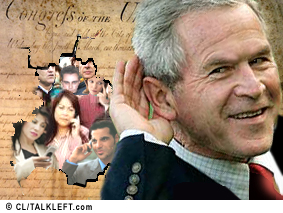Federal Judge Rules Bush's Warrantless NSA Wiretapping Illegal

A federal judge in San Francisco ruled today in an 45 page opinion (available here) that former President Bush's warrantless NSA wiretapping program was illegal.
The case involved the Al-Haramain Islamic Foundation, an Islamic charity, and two of its lawyers, Wendell Belew and Asim Ghafoor, who alleged their conversations were illegally intercepted. The Court granted their motion for summary judgment finding the Government is liable for damages for illegally wiretapping their conversations without a FISA warrant. [More...]
| < Wednesday Afternoon Open Thread | Swiss Put Polanski Extradition on Hold Pending CA Ruling > |



